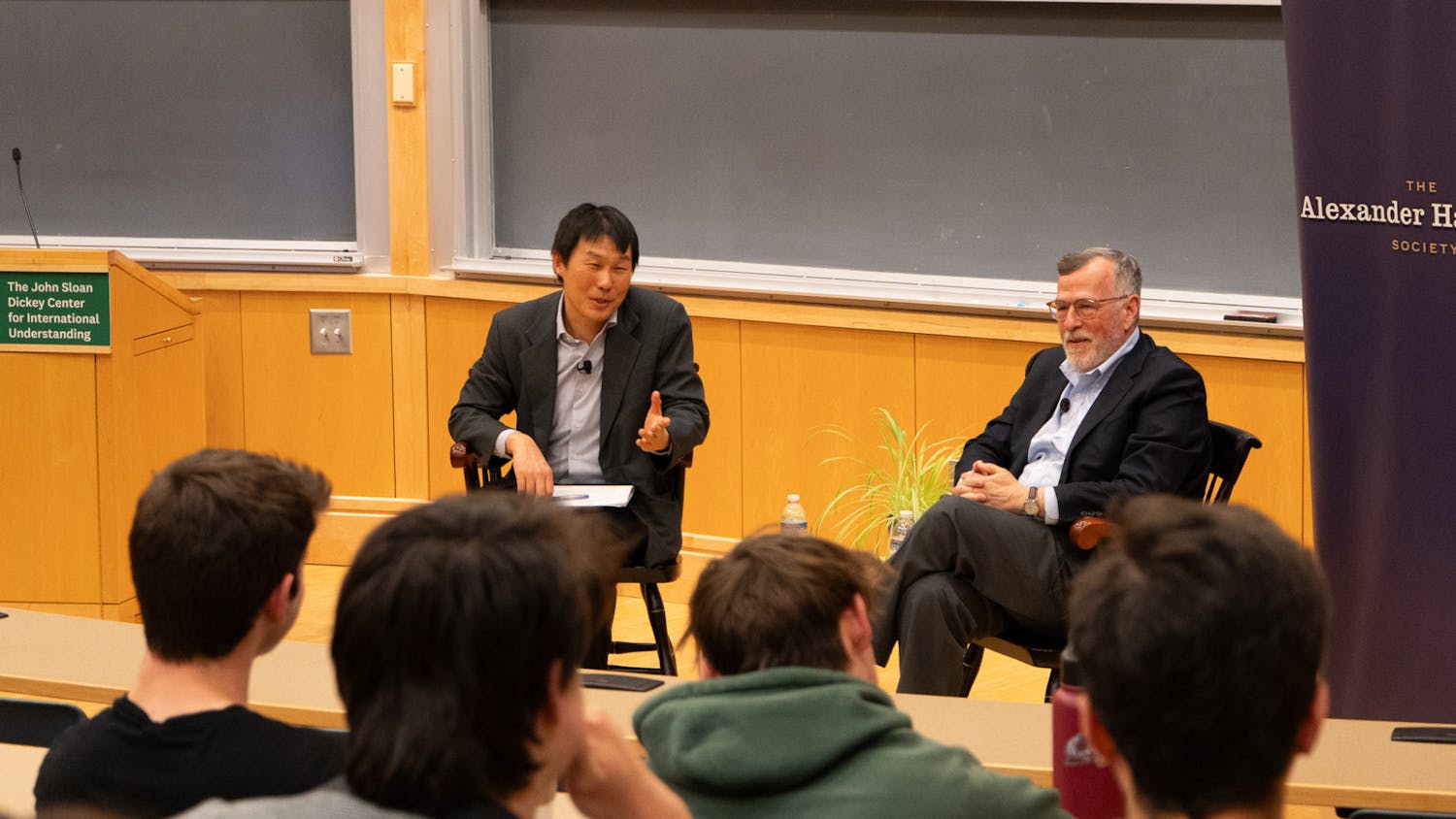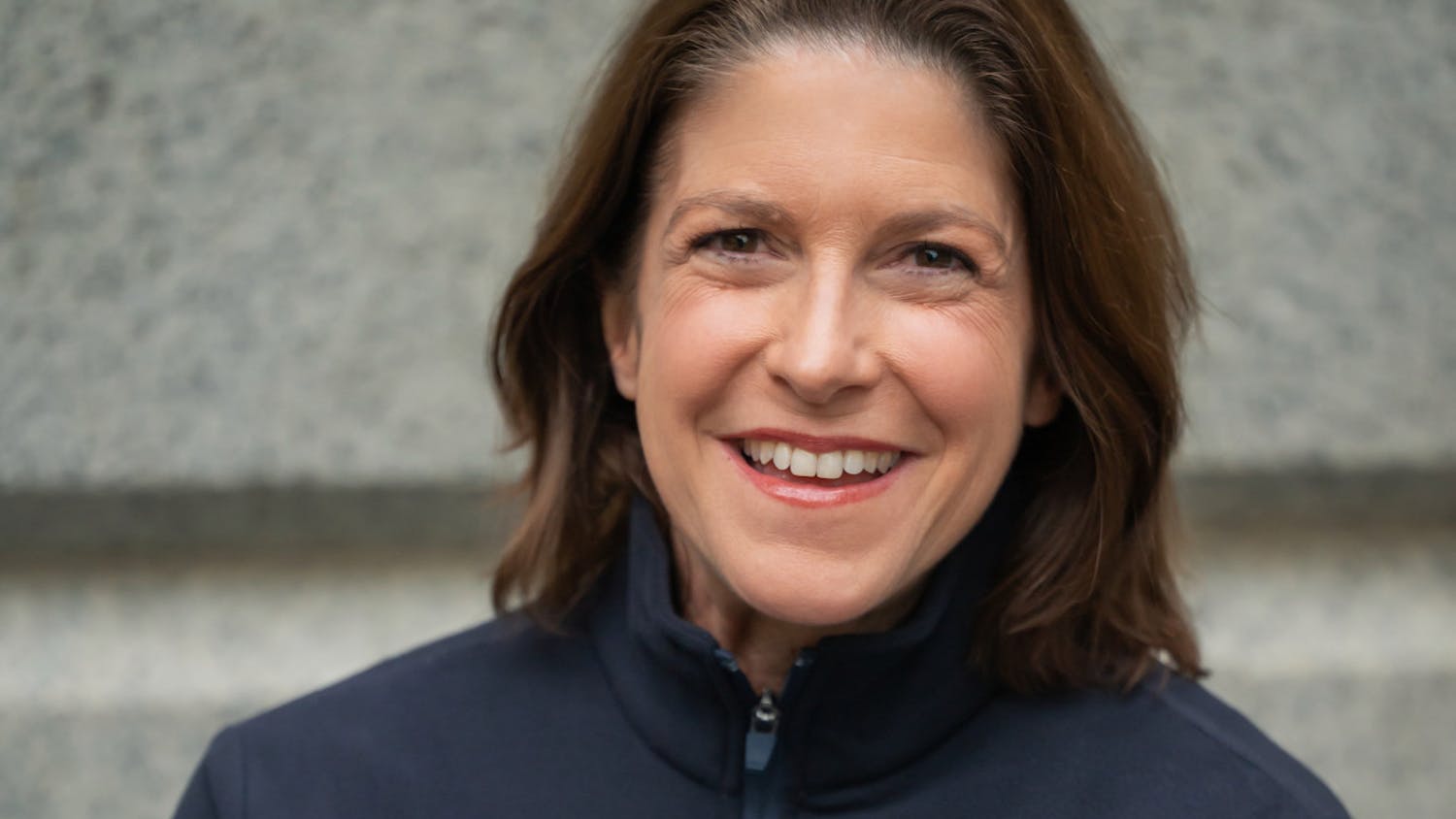On Nov. 1, individuals from across campus gathered in Collis Common Ground to hear business ideas from students, faculty and staff in The Pitch, an entrepreneurship competition hosted by the DALI Lab and the Magnuson Center for Entrepreneurship. Three teams of students won prizes to support their entrepreneurship at the College.
Any member of the Dartmouth community can apply to participate in The Pitch. This year, 10 applicants were selected to present their ideas to an audience and a panel of judges comprised of two students selected by DALI and two students selected by the Magnuson Center. DALI director Tim Tregubov said that in the past, 20 applicants have been accepted.
The participants were each given two minutes to pitch their idea. Each group then had to field one question from the judges and one from the audience. In the past, judges and audience members did not have the opportunity to ask questions. According to Tregubov, this new component of the competition provided the judges with much-needed clarity on the various pitches.
Another recent change is the number of Pitch events per year. In the past, The Pitch took place each term, although last year it was only offered once. This year, it will take place again in late winter.
“It’s been fun seeing the event evolve,” Tregubov said. “This time I think we’ve stumbled on something cool.”
He added that the quality of the proposals has increased as a result of the changes made this term.
“Generally, every year, the pitches and ideas get better and better just as the overall entrepreneurial spirit grows on campus,” Tregubov said.
Ultimately, there were three winners, each receiving a different prize: the DALI Prize, the Magnuson Prize and the Audience Vote.
The DALI Prize provides the winner with a term of collaboration with DALI Lab for free. Normally, DALI charges around $8,000 for such collaboration. DALI Lab provides the winner with a team of student developers and designers who will build a prototype of the product.
The winner of the DALI Prize this term was Zirui Hao ’22, whose team also included Adam McQuilkin ’22 and Ziyi Yue ’22.
Hao’s project aims to streamline the course planning process for Dartmouth students. His team is developing an algorithm that will allow students to input the courses that they would like to take and then generate possible course schedules, factoring in time slots, prerequisites and major and distributive requirements.
“All those minute details are handled by the algorithm, and then it generates possible plans that you could follow,” Hao said. “So basically all the user has to do is specify what they want, and then this planning assistant will give them that by doing the actual dirty work of making sure everything fits.”
Hao said he plans to use the support from DALI to develop his algorithm.
“We have a graphic designer and we have a web developer, but typically a project of that scale would involve a lot more time if you only had three people,” he said. “A DALI team will make it a lot quicker.”
Similarly to Tregubov, Hao also noted that he thinks the entrepreneurial culture at Dartmouth is growing.
“If you have the slightest idea that you want to do something … then you should go for it because there [are] so many resources like The Pitch,” he said.
The Magnuson Prize provides the winner with a $1,000 cash prize and startup support. Additionally, it gets teams into the “pipeline” of Magnuson Center prizes and funding sources, according to Tregubov.
Caroline Leone Tu’19 won the Magnuson Prize for her startup Corleone.
“Corleone is a digital native dance apparel brand,” Leone said. “We manufacture and produce dance apparel and accessories, focusing on sustainable sourcing and ethical production.”
Leone plans to partner with dance studios and give back a percentage of profits to help young and aspiring dancers and dance studios, which are often very underfunded, she said.
She said that she plans to use the funding and support from the Magnuson Center to develop leotard and apparel prototypes and start building Corleone’s website.
Leone also noted that Dartmouth has provided her with crucial support in pursuing her idea. She is currently working with individuals from the Magnuson Center, the Thayer School of Engineering and the Tuck School of Business to build her business.
“I think it’s worth noting that the company was really born at Tuck and at Dartmouth, and in the last three months I’ve received incredible support from across the Dartmouth community,” she said.
The Audience Vote prize, which audience members voted on with text messages, provides the winner with $1,000 and support from the Magnuson Center.
The Audience Vote went to Max Goldman ’20, whose team also includes Ryan Blankemeier ’20.
Blankemeier and Goldman proposed an app that will connect small businesses on college campuses with students. Students who download the app and create a profile will receive discounts to use at local small businesses, Goldman said. As students use the app, businesses will be able to learn more about their client base. He added that the app will attract more students to participating businesses and increase their sales.
Goldman said he thinks the app will be of particular importance to Dartmouth, adding that it may prevent failures like that of Everything But Anchovies or the Dartmouth Bookstore.
“Unfortunately, in Hanover certain small businesses have struggled,” he said. “[Everything But Anchovies] failed to compete with Domino’s. We’re now seeing the Dartmouth Bookstore [failing] to compete with Amazon and other online booksellers, so this is an issue that we’re really passionate about and also something that is particularly relevant.”
Goldman said he plans to use his funding and support from the Magnuson Center to reach three milestones he and Blankemeier have established.
“The most important [milestone is] developing a prototype app for the business, and then selecting an appropriate model for sales analytics and predictability and [also devising] a model for executing transactions through the app,” he said.
Annie Ren, program manager for startup support at the Magnuson Center, noted that she hopes to continue to support students whose business plans were not selected as winners in The Pitch.
“Anyone at any level ... can participate,” Ren said. “The whole idea is that you can start with The Pitch … once you’re done with that, we hope that you will follow through with our other avenues for starting up.”
For Ren, one goal for The Pitch is to increase awareness of entrepreneurship on campus.
“I love the different ideas that are coming across campus and the different people from their different backgrounds who contribute ideas,” she said.
Additionally, Ren said she hopes The Pitch attracts an increasingly diverse group of participants in the future.
“My other hope is always that we see an increase in women, in people of color, [and] in the kind of diverse presentation of ideas that come from across campus,” she said.
Correction appended (Nov. 9, 2018): This article has been updated to reflect that Marina Chiesa Tu’19 is no longer a member of Caroline Leone Tu’19's team.



